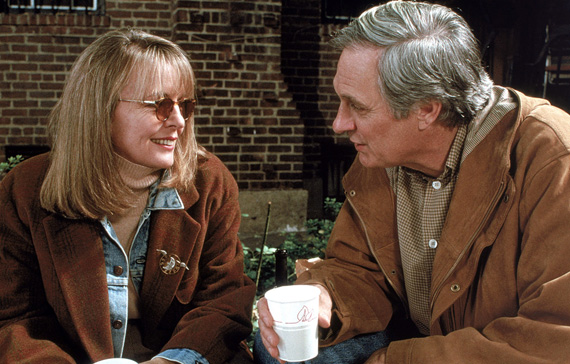

Director: Woody Allen, 1993 (PG)
Woody
Allen reprises her neurotic New Yorker role (“claustrophobia and a dead bod –
this is a neurotic’s jackpot!") in this spoof of murder mysteries and film noir
classics. Filled with rapid-paced one-liners, the comedy comes thick and fast.
Teamed with Diane Keaton, his co-star from Annie Hall, this could almost be a
sequel to that Oscar winner a decade on.
Allen
plays Larry Lipton, a New York editor married to Carol (Keaton) who is thinking
of getting into the restaurant business. Their marriage is on auto-pilot; their
love-life a faded memory. But a late-night interaction with elderly neighbors
Paul (Jerry Adler) and Lillian House (Lynn Cohen) in their apartment leads to
drinks and discussion. The next day Lillian dies of a heart attack, but Paul
seems too cheerful, too ready to move on. And Carol suspects foul play. She
wants to investigate this “Manhattan murder mystery” despite Larry’s pleas to
ignore this and let it go.
The
initial structure clearly comes from Hitchcock’s Rear Window, but Allen focuses
on comedy rather than suspense. He references Billy Wilder’s film noir classic,
Double Indemnity mid-stream, and closes the movie with scenes from Orson Wells’
Lady from Shanghai. In between there are any number of subtle references to
other Hitchcock classics as well as to his own earlier films.
As
Larry retreats into his neurotic timidity, Carol reaches out to Ted (Alan
Alda), Larry’s recently divorced best buddy who coincidentally has a thing
going for Carol. He is happy to indulge her amateur detective dreaming as it
puts them together for extended times. At the same time, Larry clearly flirts
with Marcia Fox (Anjelica Huston), a writer who comes on to him. Eventually,
all four team up to solve the mystery of Mrs. House’s death.
The
plot sounds silly and with other directors it probably would be. But Allen, who
co-wrote the script, brings his characteristic dialog to bear and this makes
the movie. At one point, trying to stamp his authority on his marriage when
Carol wants to go out snooping in the middle of the night, he says: “I’m your
husband; I’m commanding you to sleep. Sleep! I command it. I command it. Sleep!
I forbid you to go. I’m forbidding.” When she ignores him and goes, he gives
up: “Is this what you do when I forbid
you?” Classic Woody!
As
funny as this is, Manhattan Murder Mystery surprisingly offers a commentary on
the life and death of marriage. Carol describes their marriage as an old shoe,
worn and comfortable, but not quite worn out. She tells Larry, “You’ve gotten
stodgy in your old age.” The sad thing, is he is not old; he just lives like he
is. He epitomizes the old fuddy duddy, always afraid of something new, ready to
settle back into the cocoon of tranquility he has crafted.
 Ted
and Larry contrast each other. Larry offers little to the marriage. He
represents boredom. Ted offers intrigue and interest. As a man interested in a
conquest, he represents the bedroom. With him, there would be activity and
excitement. With Ted there is simply sleep!
Ted
and Larry contrast each other. Larry offers little to the marriage. He
represents boredom. Ted offers intrigue and interest. As a man interested in a
conquest, he represents the bedroom. With him, there would be activity and
excitement. With Ted there is simply sleep!
Rolling
Stone, in their review, said: “Larry and Carol have lost that ability to
surprise each other. Their marriage is a truce.” That may be so, but it is
headed for the same cemetery that Mrs. House was supposed to be buried in. It
died long ago and is merely waiting for burial.
Marriage
needs nurture. It cannot survive without spice. Comfort inevitably leads to
stagnancy and boredom. A healthy marriage must evolve and grow as the spouses
evolve and grown. It requires an emotional investment.
 From
the very beginning God created marriage as a “one-flesh” relationship (Gen. 2:24).
This refers to the closeness and intimacy of the husband-wife relationship. It
is special, and images the relationship between God and his followers (Eph. 5:32).
A growing marriage is characterized by the ever-deepening sense of closeness
and intimacy.
From
the very beginning God created marriage as a “one-flesh” relationship (Gen. 2:24).
This refers to the closeness and intimacy of the husband-wife relationship. It
is special, and images the relationship between God and his followers (Eph. 5:32).
A growing marriage is characterized by the ever-deepening sense of closeness
and intimacy.
Moreover,
this one-flesh concept points also to the idea of loving spouse like loving
yourself. Paul tells us, “husbands ought to love their wives as their own
bodies. He who loves his wife loves himself” (Eph. 5:28). In a healthy psyche,
we all love ourselves. And this means we want to make ourselves happy. In a
healthy marriage, we should seek to make our partners happy. When we do so, we
are growing the marriage and ultimately making ourselves happy, too.
Finally,
a healthy marriage needs some spice and surprise, something out of the
ordinary. When Larry eventually gets into the spirit of the mystery (after some
pangs of jealousy), he begins to regain a sense of life and joy. And this in
turn spurs desire on the part of Carol. She sees in Larry what brought them
together. Now, Ted is no longer an attraction. He can be with his series of conquests,
moving on when the attraction and the spice fades.
How
is your marriage? Is it growing, blossoming like a flower to fill each room of
your home with a sweet fragrance? Or is it in a truce, ready to die? If the
latter, it’s time to find your own Manhattan murder mystery and rekindle the
fires of romance. It’s never too late!
Copyright ©2012, Martin Baggs


No comments:
Post a Comment